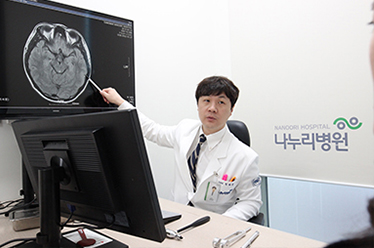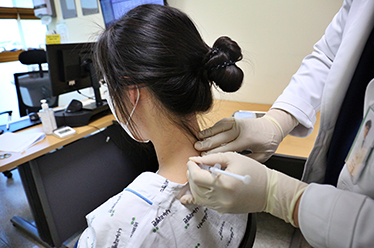At Nanuri Hospital's Cranial Nerve Center, neurologists accurately diagnose and treat diseases that occur in the central nervous system including the brain and spinal cord, and the peripheral nervous system including cranial nerves, peripheral nerves, and muscles.
Headaches are divided into primary headache and secondary headache. Genrally the headache corresponds to many cases of primary headache, but secondary headache caused by cerebrovascular disease can be life-threatening, so appropriate diagnosis is required according to symptoms.
| Primary headache | It is a headache with no clear cause and is divided into migraine, tension-type headache, cluster headache, and primary stabbing headache according to clinical symptoms. |
| Secondary headache | Headache with a clear cause, such as meningitis, brain tumor, stroke, medication overuse headache, or trauma |
The patient's symptoms are the most important for diagnosis. The cause of the headache is analyzed by medical history, brain MRI, and cerebral blood flow ultrasonography. In the case of migraine, which is the biggest cause of headaches, headaches can be controlled by inhibiting CGRP, the causative agent of migraine. Migraine prevention treatment is performed through Emgality(Galcanezumab), Ajovy(Fremanezumab), and Botox treatment, and cervical headache and occipital neuralgia are controlled through nerve block.
 [Brain MRI test and Clinical Diagnosis] |
 [Transcranial Doppler Ultrasound(TCD)] |
 [Botox treatment] |
Brain MRI Scan
This is a test to diagnose abnormalities in brain tissue and blood vessels. Compared to CT scans, the resolution is better, so the location of brain lesions and blood vessel conditions can be clearly identified.
Transcranial Doppler Ultrasound(TCD)
It is a test that measures the speed of blood flow in the blood vessels of the brain and to check stroke, blood vessel disorder test, dizziness evaluation, etc.
Q1. Can I take painkillers when I have a headache?
It is better to take painkillers than to endure occasional headaches. However, if you have chronic headaches, taking painkillers for more than 10 to 15 days can cause medication-overuse headaches.
Q2. Are there any medications to prevent chronic migraines?
If you experience migraine headaches more than once or twice a week, or if you have migraine attacks more than once a week, it is recommended that you take prescription medications to prevent headaches. It is a medicine that reduces the frequency and intensity of headaches. Since it is not a pain reliever, it is okay to take it every day. Recently, injection treatments such as Botox and CGRP inhibitors are also performed.
